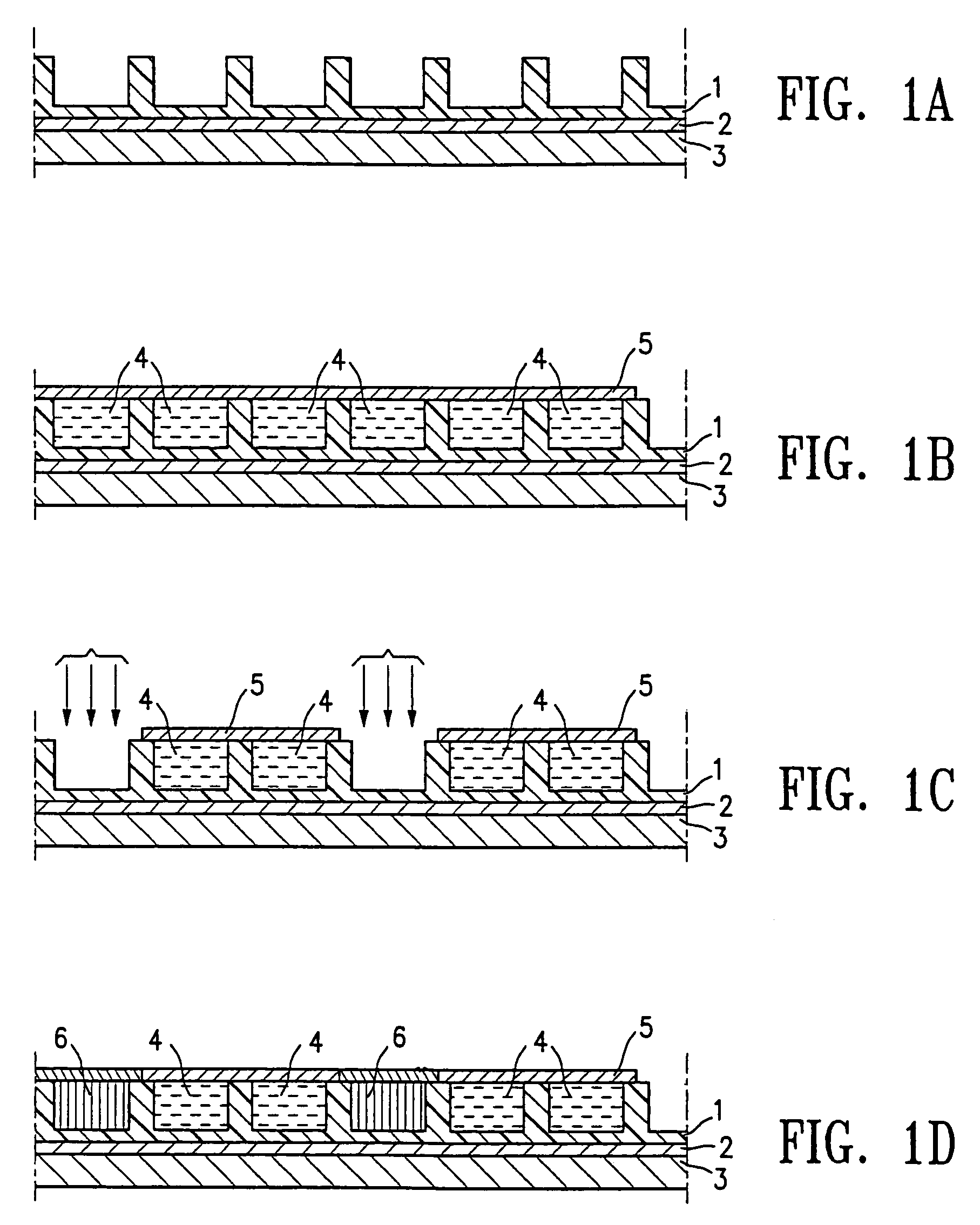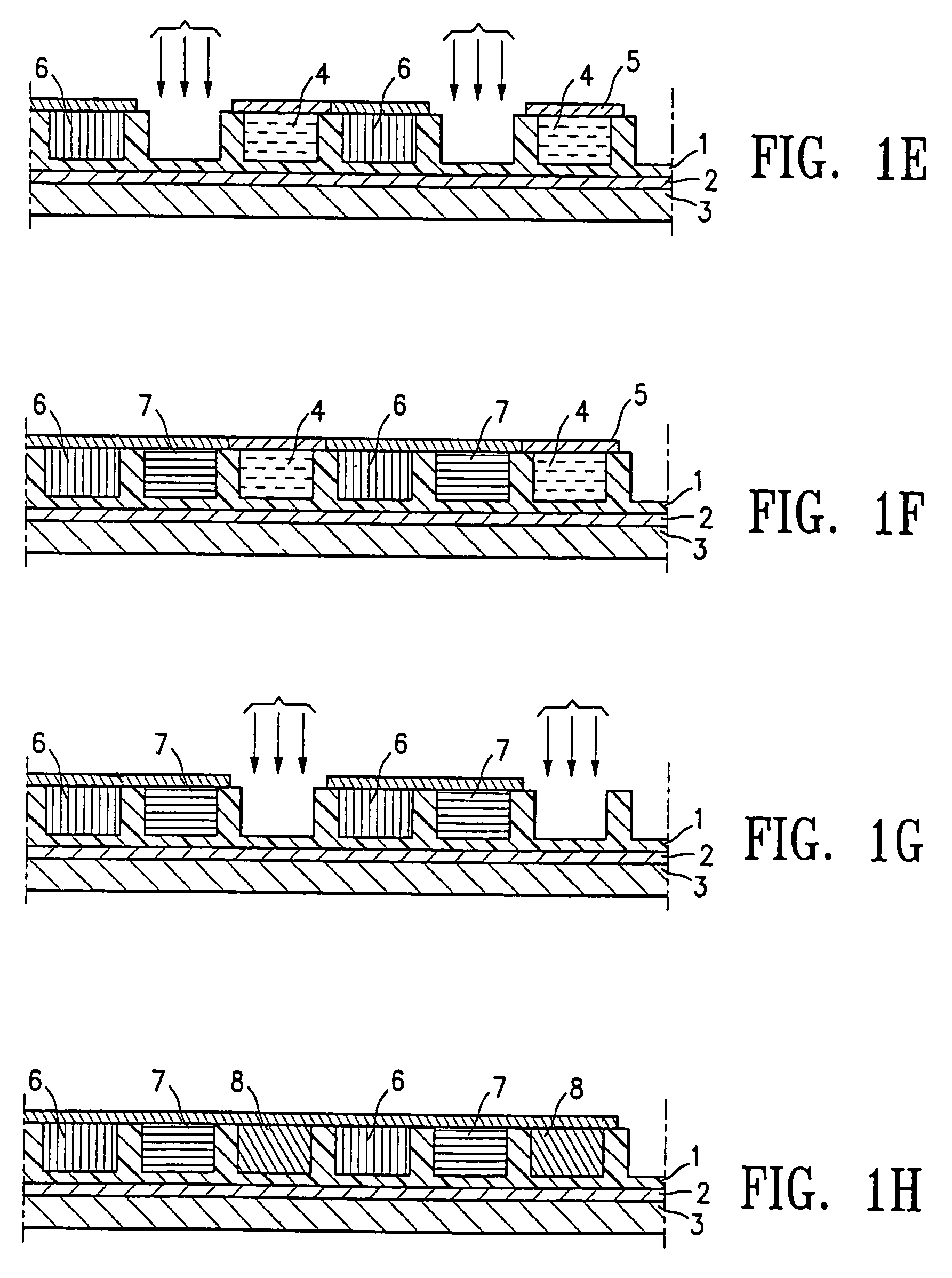Process for imagewise opening and filling color display components and color displays manufactured thereof
a technology of color display components and manufacturing process, applied in the field of electrophoretic displays, can solve the problems of high cost, low throughput of filling and sealing process of electrophoretic fluid in these cells, and defects in finished displays that are often observed, so as to achieve simple and efficient manufacturing processes, reduce processing costs, and improve mechanical and dissolution characteristics.
- Summary
- Abstract
- Description
- Claims
- Application Information
AI Technical Summary
Benefits of technology
Problems solved by technology
Method used
Image
Examples
example 1
Microcup Formulation
[0053]35 Parts by weight of Ebecryl 600 (UCB), 40 parts of SR-399 (Sartomer), 10 parts of Ebecryl 4827 (UCB), 7 parts of Ebecryl 1360 (UCB), 8 parts of HDDA (UCB), 0.05 parts of Irgacure 369 (Ciba Specialty Chemicals), and 0.01 parts of isopropyl thioxanthone (ITX, Aldrich) were mixed homogeneously and used for micro-embossing.
example 2
Preparation of Microcup Array
[0054]A primer solution comprising of 5 parts of Ebecryl 830, 2.6 parts of SR-399 (Sartomer), 1.8 parts of Ebecry 1701, 1 part of PMMA (Mw=350,000, Aldrich), 0.5 parts of Irgacure 500, and 40 parts of methyl ethyl ketone (MEK) was coated onto a 2 mil 60 ohm / sq. ITO / PET film (Sheldahl Inc., MN) using a #3 Myrad bar, dried, and UV cured by using the Zeta 7410 (5 w / cm2, Loctite) exposure unit for 15 minutes in air. The microcup formulation prepared in Example 1 was coated onto the treated ITO / PET film with a targeted thickness of about 50 μm, embossed with a Ni—Co male mold having a 60 (width) μm×60 (length) μm repetitive protrusion pattern with 10 μm wide partition lines and UV cured from the PET side for 20 seconds, removed from the mold with a 2″ peeling bar at a speed of about 4-5 ft / min. Well-defined microcups with depth ranging from 10 to 50 μm were prepared by using male molds having corresponding protrusion heights.
example 3
Comparative Example
Microcup Array Laminated with Novolac Photoresist
[0055]3 Grams / M2 (dried) of the positively working photoresist SJR-5740 (Shipley, Mass.) was coated on a removable clear support PET-4851 (Saint-Gobain, Mass.) with a Myrad bar. Onto the photoresist, 3 gm / m2 (dried) of an alkali-developable adhesive composition comprising 9 parts of Nacor 72-8685 (50% solid, National Starch) and 91 parts of 20% aqueous solution of Carboset 515 (BF Goodrich) was then coated with a Myrad bar. The three layer adhesive / photoresist / support was then laminated at 40° C. onto a 10 micron deep and empty microcup array prepared according to Example 2. The PET support was removed, and the photoresist laminated microcup array was imagewise exposed through a photomask using the Zeta 7410 (5 w / cm2, Loctite) exposure unit for about 1 minute and then developed by Developer-453 (Shipley) for 2 minutes. Deterioration of photoresist integrity in the non-exposed regions such as pin holes and delaminati...
PUM
| Property | Measurement | Unit |
|---|---|---|
| thickness | aaaaa | aaaaa |
| thickness | aaaaa | aaaaa |
| diameter | aaaaa | aaaaa |
Abstract
Description
Claims
Application Information
 Login to View More
Login to View More - R&D
- Intellectual Property
- Life Sciences
- Materials
- Tech Scout
- Unparalleled Data Quality
- Higher Quality Content
- 60% Fewer Hallucinations
Browse by: Latest US Patents, China's latest patents, Technical Efficacy Thesaurus, Application Domain, Technology Topic, Popular Technical Reports.
© 2025 PatSnap. All rights reserved.Legal|Privacy policy|Modern Slavery Act Transparency Statement|Sitemap|About US| Contact US: help@patsnap.com



